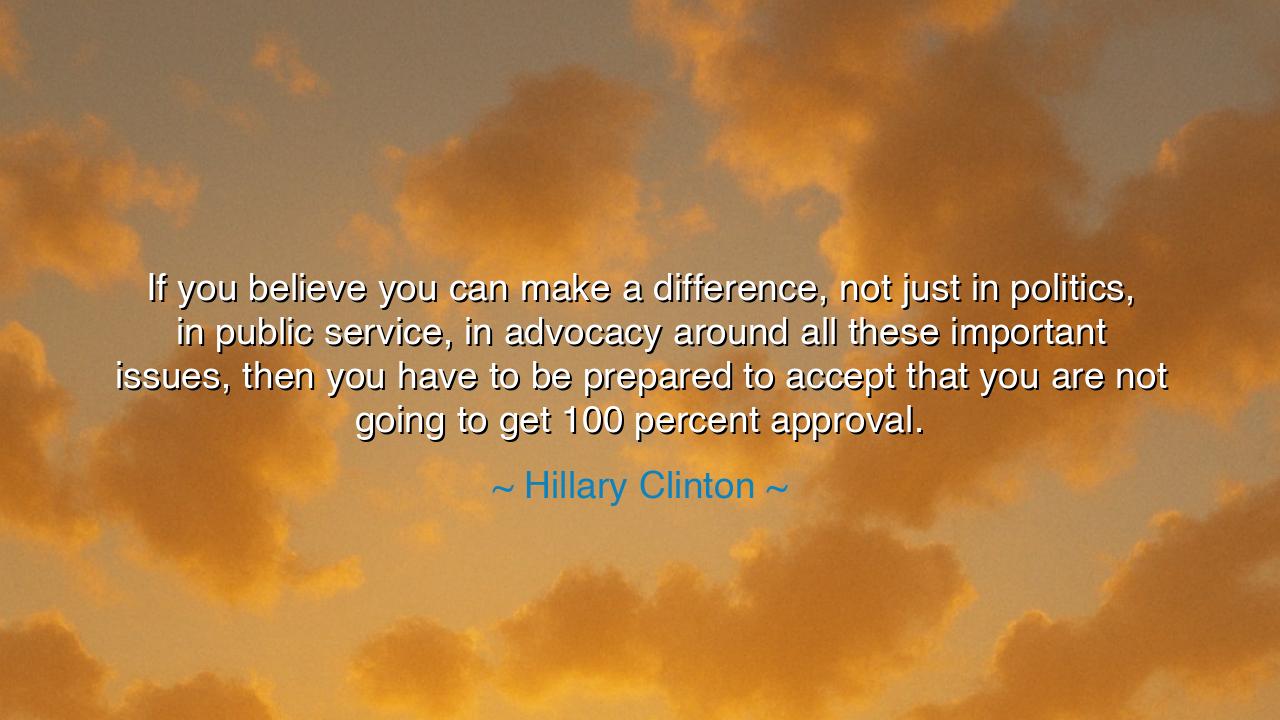
If you believe you can make a difference, not just in politics
If you believe you can make a difference, not just in politics, in public service, in advocacy around all these important issues, then you have to be prepared to accept that you are not going to get 100 percent approval.






Hear, O seekers of courage, the words of Hillary Clinton, who bore the trials of power and the fire of public judgment: “If you believe you can make a difference, not just in politics, in public service, in advocacy around all these important issues, then you have to be prepared to accept that you are not going to get 100 percent approval.” In these words lies a truth as old as leadership itself: those who would shape the world must walk not on a path of applause, but upon the sharp stones of resistance.
For the work of public service is not the work of pleasing all. To take up the mantle of advocacy is to stir waters that others wish left still. The leader who dares to change laws, to challenge injustice, or to defend the weak must accept not only gratitude, but scorn. There is no crown without thorns, no torch without the risk of burning. Clinton’s words ring with the wisdom of experience: to seek approval from all is to achieve nothing; to seek justice is to endure division.
History bears witness to this. Consider Abraham Lincoln, who in the midst of civil war bore the fury of half a nation. His decision to issue the Emancipation Proclamation was hailed by some as divine justice and cursed by others as ruinous treachery. He was mocked, reviled, and threatened with death. Yet through his perseverance, a people in bondage were set upon the path to freedom. He did not gain 100 percent approval; instead, he gained a place in the eternal memory of humanity.
The lesson endures: the measure of true leadership is not found in universal praise, but in the willingness to bear the weight of discontent for the sake of what is right. Those who follow only the voices of approval are like reeds swaying in the wind; but those who hold fast to conviction, even in the storm of criticism, are like oaks rooted deep in the earth. Belief in the power to make a difference is not enough—it must be joined with the strength to endure rejection.
Therefore, let the generations remember: to stand for truth, for justice, for causes greater than the self, is to accept the burden of imperfection in the eyes of others. Seek not to be loved by all, but to be faithful to what is right. For applause fades, but the legacy of the steadfast endures beyond the grave. In Clinton’s words shines a call to all who would rise: if you would make a difference, do not fear disapproval—fear only the silence of having never tried.






TTung
I agree with Hillary Clinton’s point that you can’t expect universal approval, but it makes me wonder: how do leaders balance public opinion with doing what’s right? Sometimes, the best decisions are the hardest ones to make, especially when they’re unpopular. But is it sustainable for someone in public service to face constant disapproval, or does it eventually lead to burnout or compromise?
MQ40. Doan Minh Quang
This quote is a reminder that change doesn’t come easily. Public service, politics, and advocacy require a lot of resilience because you won’t always get a pat on the back. But is that something we as a society often forget? It’s easy to get caught up in the need for approval, but when it comes down to it, should we be more focused on the outcomes rather than the approval ratings?
HT26 - Tran Ha Trang
Clinton’s words make me think about how difficult it must be to stay focused on your mission when you're getting pushback from all sides. How do people in advocacy or politics develop a thick enough skin to handle criticism? Is it possible to make lasting change without accepting that you’ll never achieve universal support? And does that mean some causes are always destined to be divisive?
TLTram Le
It’s refreshing to hear Hillary Clinton remind us that not everyone will agree with you, even when you’re working for the greater good. But what happens when public approval starts to affect your ability to get things done? Can a person truly be effective in politics if they constantly worry about pleasing everyone? Or is it about sticking to your values and letting the chips fall where they may?
NCNa Ca
Hillary Clinton's quote really resonates with me because it acknowledges a hard truth: no matter how much you believe in your cause, it's impossible to please everyone. This has to be one of the toughest aspects of public service, right? How do you keep going when not everyone is on board with your vision? Is it even possible to stay motivated if you know you'll always face opposition?